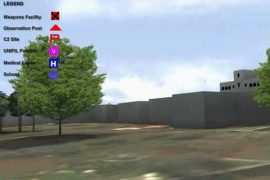1) The ITIC provides some background to the news that the ‘Great Return March’ will take on a different format in the new year.
“Hamas and other terrorist organizations participating in the return marches have recently been discussing whether or not to continue the marches, and ideas for new formats have been raised. Apparently after almost two years and 85 return marches, Hamas has come to the conclusion that the marches and their inherent violence have exhausted themselves. That is because Hamas is interested in achieving a short-term, minimalist arrangement in which there is no need to continue the marches in their current format. Moreover, the Gazans are showing signs of becoming tired of the marches (and Hamas is obliged to consider the public and its hardships).”
2) At the INSS Pnina Sharvit Baruch analyses last week’s announcement by the Prosecutor of the International Criminal Court (ICC).
“Notwithstanding pressure that will undoubtedly be applied on the Court, the Court is more than likely to adopt the Prosecutor’s position that its jurisdiction covers all of the “Occupied Palestinian Territories.” The Pre-Trial Chamber bench is fixed, such that these are the same judges who ruled in November 2018 that the Prosecutor must review her decision not to launch an investigation in the Marmara flotilla affair, and which in July 2018 instructed, in unprecedented fashion, that the Court Registry set up an information and outreach mechanism for victims in Palestine while the preliminary examination was still under way. In other words, this is a bench whose attitude toward Israel is, to say the least, unfriendly.”
3) MEMRI’s translation of an interview with Saeb Erekat provides more background to the ICC story.
“Saeb Erekat, Secretary-General of the PLO Executive Committee, was interviewed on Palestine TV on December 21, 2019. In the interview, he said that Palestinian Authority President Mahmoud Abbas appointed a committee that would pursue legal action against Israel in the International Criminal Court (ICC). He added that the committee includes members from Hamas as well as “all Palestinian political factions”, such as PFLP and DFLP. Erekat thanked Qatar for providing financial aid to cover the legal fees.”
4) At the Jewish Review of Books, Matti Friedman reviews a new work.
“The ship, SS Kedmah, was the very first vessel belonging to the Zionist movement’s new shipping company, ZIM. It was sailing for the Land of Israel, still under British control, where its arrival was occasion for a national celebration in the Jewish home. […]
As usual, the story—as told in Kobi Cohen-Hattab’s excellent new history, Zionism’s Maritime Revolution—wasn’t that simple. The new Zionist ship was, in fact, a refurbished English vessel with 20 years of rough service behind her, including the wartime evacuation of Singapore in 1941. She nearly broke down in the Mediterranean en route to the Yishuv. Saltwater got into the internal systems, the refrigerators didn’t refrigerate, the ovens didn’t cook, and the lights went out. The crewmen, who were Jewish, couldn’t stand the officers, who were British. The feeling was mutual, and eventually there was—inevitably, in those times of proletarian consciousness—a strike.”




